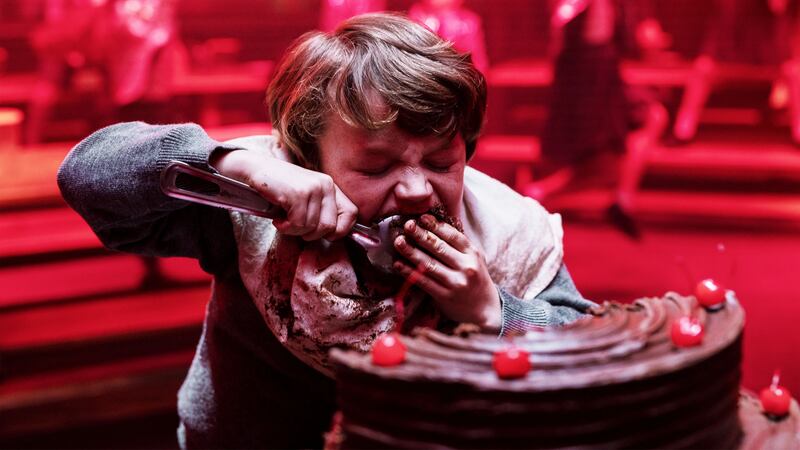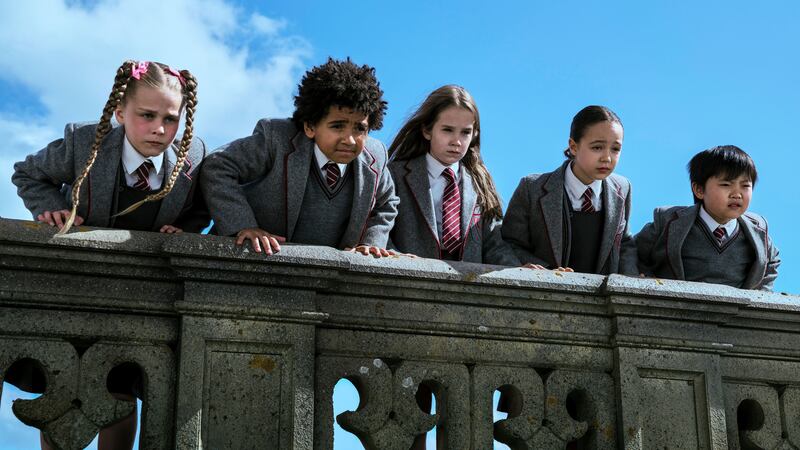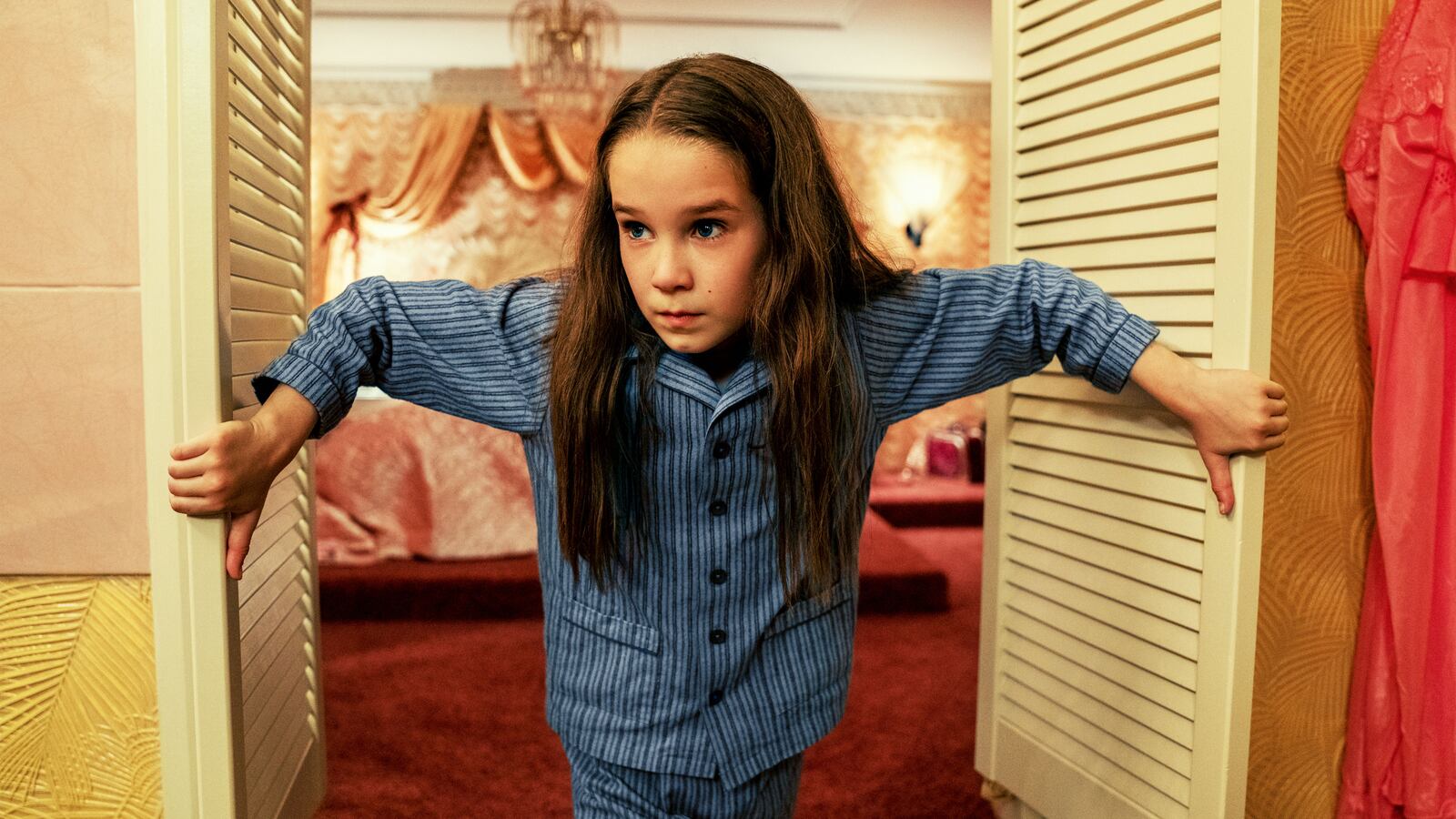This is a preview of our pop culture newsletter The Daily Beast’s Obsessed, written by editor Kevin Fallon. To receive the full newsletter in your inbox each week, sign up for it here.
There’s something gratifying during the holiday season about watching children stage an uprising against a sniveling, diabolical, oppressing overlord who has ruined their lives. In their success, those kids turn the world into the accepting utopia it should be. That is to say that this holiday season in particular, with those in power hellbent on making life miserable for us all, there’s something invigorating about Roald Dahl’s Matilda the Musical.
I had been resistant to watching the musical, which is now on Netflix. I don’t know why. I love musicals. Now that I’ve seen it, I feel foolish. It’s wonderful.
Roald Dahl’s story, about a telekinetic child who, ignored by her parents, is sent to a school where students are demeaned and tortured as a way of falling in line, is as captivating as ever. (The 1988 novel was turned into a 1996 movie starring Mara Wilson.)
Matilda, played here with star-making vivaciousness, spunk, and wide-eyed tenderness by Alisha Weir, has too much intelligence to tolerate the injustice she sees. Sure, she has the superpowers to stand up to the tyrant, Emma Thompson’s ghastly headmistress Miss Trunchbull, and incite an uprising. But it takes the whole student body, each of whom has that spark within, to join in to make the change happen.
Like much of Dahl’s work, it doesn’t patronize its readers by pretending the world isn’t dark and unfair. Matilda leans into the fact that it can be downright cruel and mean. (Preach!)
Matilda is born to parents who don’t want her. When they’re not berating her as a “lousy little worm” or “nasty little troublemaking goblin,” they are banishing her to an attic, where she escapes through books she lends from her local librarian—her only confidante. Going off to school should be a dream respite from this miserable existence. Mrs. Trunchbull has other plans.
“This isn’t a school. It’s a prison,” Matilda is advised when she arrives, excited for her first day. Her classmates are a mixture of jaded and resigned. They know the drill. Fall in line, or risk being sent to solitary confinement—or even worse punishments, like being forced to eat an entire multilayer chocolate cake or being hurled like a shot put by your pigtails.

Trunchbull’s motto for her school is “Bambinatum est maggitum,” which translates to, “Children are maggots.” That might seem outrageously cartoonish, the invention of a children’s author trying to make hyperbole out of a school’s harshness in order to get through to young readers. But, um, look around, folks. It’s not far-fetched.
There’s no shortage of legislation that dehumanizes children and restricts what they can be taught, while educators around the country will tell you how frustrating it is that mandates have turned students into nothing more than testing scores and statistics.
Branch out beyond the young population, and adults feel it, too: the helplessness when those in charge don’t think of you or your well-being as worth validating. That applies to the housing crisis, the cravenness of the health insurance and pharmaceutical industries, or the dog-whistling upholding the rise in antisemitism, racial hate, and transphobia. On a more granular level, it’s the deep-sigh reaction to what’s happening with Twitter, or the unforgivable series of decisions that led to the fiasco with Southwest Airlines that affected millions of people this week.
It sounds silly to extrapolate any of this from… the Matilda musical. Yet when Matilda starts singing, “Just because you find that life’s not fair, it / doesn’t mean that you just have to grin and bear it,” you find yourself calling out in response, “Yeah girl!” Yes, this is a story about a child’s revenge. But, like every great children’s story, there are base-level lessons about humanity that should stir something in all of us.
Dahl’s an expert in that, and this particular cinematic adaptation—complete with Tim Minchin’s music from the West End and Broadway stage productions—excels at lavishing in the fantasy and the fanciful, creating a sense of wonder that, nonetheless, always stays grounded.
Thompson’s Trunchbull is a monster, as vivid and deliciously grotesque as in any creature feature. She’s padded to an imposing stature, with her bulbous warts, yellowed teeth, and broken capillaries dotting her face as she sneers, spits, and bullies. She is a juxtaposition herself: as militant and concerned with order as she is crude and gross. To call a performance of this kind of character delightful might seem strange, but such are the transformative powers of Thompson. It’s a triumph that is a complete 180 from her sensitive tour de force earlier this year in Good Luck to You, Leo Grande.

Tempering Trunchbull’s insidiousness is Miss Honey, played by Lashana Lynch in a similarly impressive show of range, after appearing so formidable in the action-heavy The Woman King. Miss Honey is Matilda’s lifeline, a compassionate, if sometimes meek advocate for the students—even if Trunchbull’s reign of terror dominates.
All of this wouldn’t matter if the singing or dancing weren’t so good. (This is a musical, after all.) And this ensemble of kids… wow. What are the memes and the lingo the youths say these days? They ate. Quote Gigi Hadid, “Slay, big slay.” Their dancing was a major flex and that’s on periodt.
Hell if I know how young people will describe it, but I’d call it thrilling.
Director Matthew Warchus did something that, bafflingly, is rare for recent movie musicals: He let us see the dancing. Long, sustained group shots allow us to see these kids nailing incredible choreography. The highlight of the film, “Revolting Children,” finds the students storming through the hallways while executing complicated dance moves that are all rapid movement and sharp elbows, captured in vigorous, long tracking shots as they move through the school. It ranks high among the coolest movie sequences I’ve seen this year.
“We are revolting children living in revolting times,” they sing, as they take back their right to a happy life—heck, even just a normal one. “We will become a screaming horde… Never again will we be ignored.”
I gotta say: It’s quite the rallying cry.
Keep obsessing! Sign up for the Daily Beast’s Obsessed newsletter and follow us on Facebook, Twitter, Instagram and TikTok.






